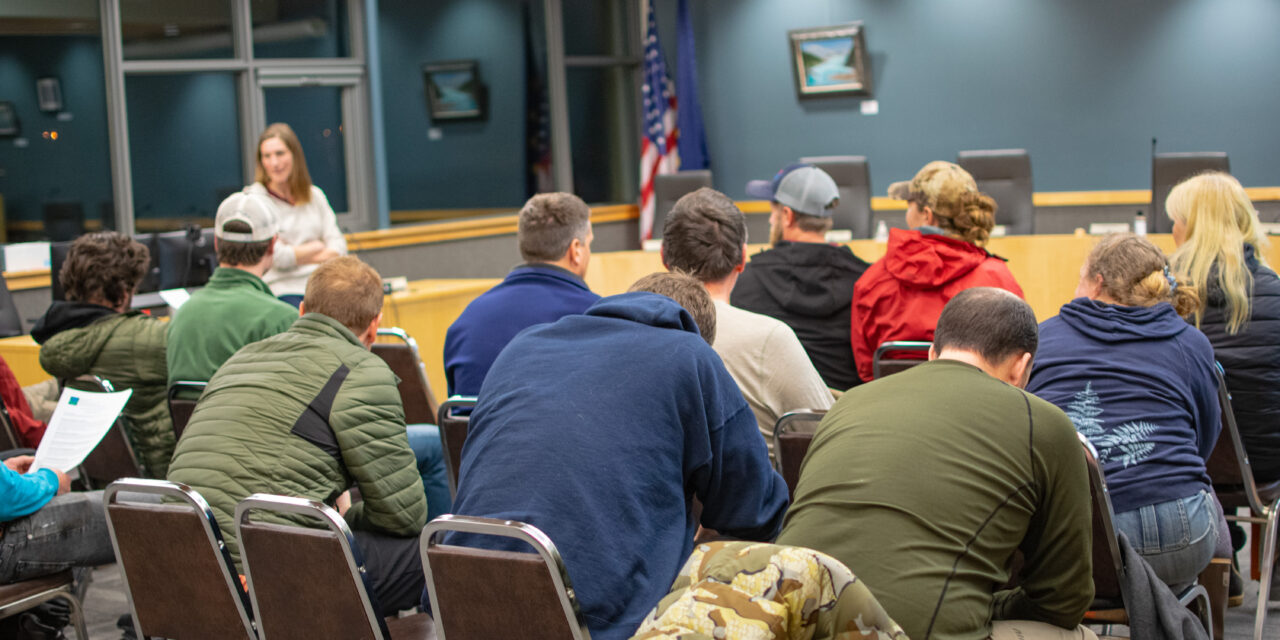Researchers from the National Oceanic and Atmospheric Administration visited Petersburg to take the pulse on climate change from the local fishing fleet. About a dozen fishermen came to discuss community resilience under a changing climate.
Lively discussion bounced off the walls of the Borough Assembly Chambers. For a weeknight in Petersburg, turnout is impressive. Fishermen young and old, wearing brown Xtratuf boots or button-downs, came to engage with the visiting scientists.
Climate change is the topic du jour. But Marysia Szymkowiak and Andrew Steinkruger aren’t climate scientists — they’re social scientists. They host conversations like these all over Alaska to gather a better understanding of stressors on fishing communities. Szymkowiak leads the conversation.
“Fishermen don’t necessarily show up to all of the conversations that affect their long-term life, right?” Szymkowiak asked the crowd. “Their lifestyle, their economic portfolio, and so on. And as researchers, we sometimes wonder, you know, why aren’t fishermen at the table? Where are they?”
“Maybe you mean… ‘opportunity?'” replied Petersburg fisherman Cindy Moyer.
Moyer said fishermen are left out of the climate conversation and feels frustrated with outsiders making decisions that influence their bottom line.
“You’re gonna save the whales, you’re gonna save whatever you’re gonna save. There’s all these entities out there that have really good feelings about what they want to save. But they have no clue about what’s really going on. And so they get on their high horse, they get a lot of money, and they start going after the livelihood of people who have been doing this for hundreds of years, because they just don’t understand.”
The fishing industry built Petersburg a century ago and fishing sustained the people who lived here long before the island was colonized. Moyer said hasty environmental policy could hurt this legacy.
“I want to make sure that the next generation can keep fishing,” said Moyer. “The next generation wants to live this way, but government overreach has taken a lot of that possibility away.”
In addition to expanded government regulation, fisherman Jared Bright is worried about the possibility of offshore green energy developments coming to coastal Alaska. These green energy developments are known to interfere with fishing operations on the East Coast. It can be difficult to maneuver boats around them.
“Wind farms — they’re gonna want them like they are on the East Coast,” said Bright. “It’s kind of a big deal that someday they could come here. I’m more worried about it cutting us out of fishing areas.”
The group has little confidence that available science can confidently predict how climate change will affect their ability to fish in the future. However, many concede that they see dropping quotas for species like black cod. But Bright is confident that the local fisheries will weather the storm — if the government can stay out of their business.
“Everybody has to worry about when they’re trying to make a decision,” said Bright. “They forget about whether the fish are coming back, whether you’re gonna get paid for your fish, whether you can find a crew, or whether you can make your loan payment. All that stuff makes it way harder. Fishermen are very adaptive and very, like, Neanderthal at the same time. But we figure stuff out. Just don’t get in our way too much with these over-regulated things.”
Researcher Andrew Steinkruger says the group’s focus on policy set Petersburg apart from the other workshops.
“One thing we really saw today is that Petersburg fishermen are really invested in the policy process,” said Steinkruger. “And that’s just a function of their really deep engagement in regional fisheries. And so they’re really able to speak to the challenges that they’re seeing in their fisheries today in terms of the policy process.”
But Petersburg is not the first place the team encountered concerns about intergenerational access, debt structure, and sagging markets. Szymkowiak paraphrases what she’s heard across Alaska:
“Is it climate change? I don’t know — I think our ecosystems are always changing. Is it a thing I think about? Definitely. But it might not be on my top couple of things, because I’m dealing with near-term issues around operating costs and regulations and markets and so on. And then what do I need? What I need is: I need to be able to be a fisherman.”
The team says they are planning more workshops on the Alaskan coast. Their next steps are to synthesize the similarities and differences of how fishing communities are responding to climate change.












